Ever wondered why certain headlines grab your attention instantly? Or why a single word can push you to click ‘buy now’?
That’s the power of powerful words — strategic, emotional, and persuasive words used in marketing, copywriting, and content writing to influence action.
In this guide, you’ll discover the best power words, how to use them effectively, and real-world examples that show how they drive results.
Power words are words that can influence the subconscious mind. In persuasive writing and marketing, harnessing the right use of powerful words can be incredibly potent. Power words are persuasive words and phrases designed to trigger emotional or psychological responses, often used in marketing, advertising, and sales copy to influence decision-making and prompt action.
Power words go beyond mere vocabulary; they can stir emotions and spark actions in your reader.
Like the right amount of spices in a recipe, power words can make a good text great, turning simple sentences into compelling messages that drive results.
Understanding the importance of powerful words is crucial for effective communication. They help you connect with your audience on an emotional level, making your message resonate more deeply. By weaving these words into your writing, you can dramatically increase its impact.
Whether you are new to copywriting or an expert looking to upskill, this guide will show you how to choose and use powerful words to elevate your writing and marketing efforts. Power words tap into marketing psychology, making sure your content is felt and remembered by your audience.
What is Marketing Psychology and Why Does It Matter?
Marketing psychology is the science of understanding how people think, feel, and act when making purchasing decisions. It blends insights from psychology and marketing to influence customer behavior and boost conversions.
Techniques like social proof, scarcity, and emotional triggers are based on this discipline, and one of the most powerful tools in your arsenal is your choice of words.
There is a science and an art behind this, and it’s been detailed and studied over the years.
To make sense of this madness, you need to understand marketing psychology and how these brands use power words to get their target audience to do their bidding.
Marketing psychology explores the intricate ways people engage with products and services, blending elements from advertising, public relations, market research, and sales.
Sometimes called neuromarketing, this field studies and reveals the underlying motivations and behaviours of consumers. It gives marketers insights into what truly resonates with their audiences. At its core, marketing psychology seeks to understand the ‘why’ behind consumer choices. It explores how emotions, perceptions, and social factors influence purchasing decisions, enabling marketers to craft strategies that align with these psychological triggers. By understanding the processes involved in decision making, marketers can design campaigns that are more effective at connecting with consumers on a deeper level.
Marketing psychology is all about creating value and relevance for the consumer. It involves tapping into fundamental human needs and desires such as belonging, esteem, and self-actualisation, in order to position products and services as solutions to specific needs.
For example, storytelling in marketing can evoke emotions to build a narrative that is relatable to the consumer, making the product more appealing.
Let’s take a look at some real-world examples where brands were able to successfully achieve this.

Source: Guinness Launches New ‘Made Of More’ Rugby Campaign
The first is the Guinness “Made of More” campaign that featured the true story of the Japanese women’s rugby team, Liberty Fields RFC.
Through a film documentary, Guinness showcased the team’s defiance of gender norms, going against all odds to make their way into the Women’s World Cup.
This narrative aligns with the campaign’s theme of inclusivity and resonates with audiences by highlighting an authentic and inspiring story.

Source: Apple posts short movie ‘Detour’ by Michel Gondry, shot entirely on iPhone
Apple’s “Detour” film is a testament to the power of storytelling in marketing.
The film follows the adventurous journey of a lost tricycle, shot in a theatrical aesthetic that pays homage to classic French cinema. Shot entirely on an iPhone 7 Plus, it highlights the advanced filming capabilities of the iPhone.
This approach engages viewers through a captivating narrative, but more importantly, it sells a key feature of the iPhone.
You might have already noticed the powerful words used in each of the campaigns. For instance, each of these brand campaigns have been able to leverage on subtle use of power words to establish their standing against their competitors in their respective fields.
Marketing psychology is underpinned by the use of simple yet powerful techniques such as the use of power words, social proof (eg. user testimonials and reviews), and the principle of scarcity (limited time offers).
These strategies leverage psychological principles to capture attention and encourage action, making them invaluable tools for marketers.
Understanding the Essence of Power Words
Power words are emotionally charged terms used in copywriting and marketing to provoke strong feelings, build trust, and drive action. These aren’t just fancy words, they’re proven psychological triggers that boost click-through rates, increase conversions, and improve engagement.
You need to identify power words that carry strong meanings and evoke a strong emotional or sensory response. These words often tap into our deepest desires, fears, and needs, making them incredibly potent in persuasive writing and marketing.
What makes a word “powerful” depends on the context. As a rule of thumb, power words carry:
-
- Emotional weight: They evoke a strong emotional response, whether it’s joy, fear, surprise, or curiosity.
- Sensory impact: They often appeal to our senses, painting vivid pictures in our minds or evoking specific sensations.
- Clarity and specificity: Powerful words are usually clear and precise, leaving little to no room for ambiguity about what they intend to achieve.
- Relevance: They resonate with the current needs, desires, or pain points, making them feel directly addressed.
- Emotional weight: They evoke a strong emotional response, whether it’s joy, fear, surprise, or curiosity.
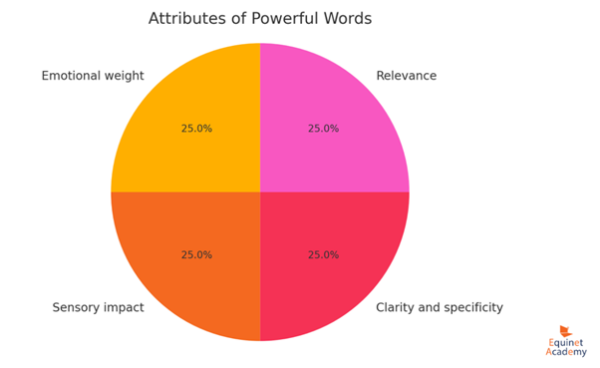
The psychology behind powerful words lies in their ability to bypass our rational thinking processes and connect directly with our emotional brain.
This connection is why powerful words can be so effective in influencing our decisions and actions.
They tap into your psychological triggers, such as the fear of missing out (FOMO), the desire for belonging, or the drive for success and security.
When you encounter these words, they can trigger a range of responses, such as:
-
- Emotional arousal: Power words can heighten our emotional state, making us more receptive to the message being conveyed.
- Emotional arousal: Power words can heighten our emotional state, making us more receptive to the message being conveyed.
A good example of this is the iconic “Just Do It” slogan from Nike. This campaign is a powerful illustration of how cultural leadership can emotionally engage, and inspire action and determination within communities.

Image source: Creatopy.com
-
- Enhanced memory: Emotionally charged content is more likely to be remembered than neutral content.
- Enhanced memory: Emotionally charged content is more likely to be remembered than neutral content.
Many charities use emotional appeals in their ads to get people to act, as it’s a strong approach that doesn’t harm the brand. A good example is Sears Craftsman, which tactfully used power words that convey guilt to show they can solve problems for their customers.

-
- Motivation to act: By striking an emotional chord, power words can motivate us to take action, whether it’s making a purchase, signing up for a newsletter, or engaging with content.
- Motivation to act: By striking an emotional chord, power words can motivate us to take action, whether it’s making a purchase, signing up for a newsletter, or engaging with content.
In many campaigns, powerful words are used to stir emotions in the audience. Our emotions profoundly affect our decisions. The careful use of power words can inspire action..
An example is the “Help Me Read This” campaign by Children of the World, aimed at improving literacy for kids in New Delhi.
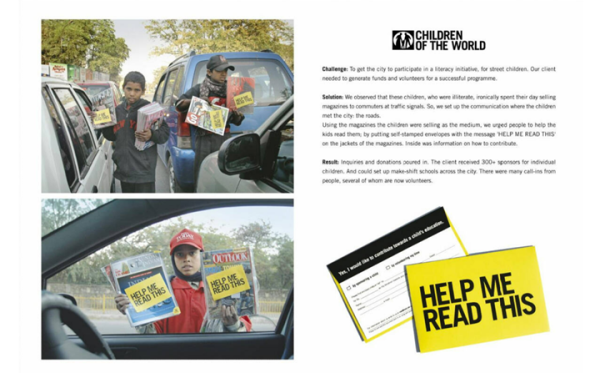
Image source: Creatopy
Understanding and leveraging the psychological effects of powerful words can transform your writing and marketing strategies. By carefully choosing words that resonate with your audience’s emotional and psychological needs, you can craft messages that not only capture attention but also encourage action.
Classifying and Exploring Types of Power Words
Power words in persuasive writing and marketing can be classified into several types, each with a unique purpose.
Emotional and Psychological Power Words
These words tap directly into the emotional and psychological realms of your audience. They are potent tools for persuasion, capable of eliciting feelings like happiness, anger, fear, or curiosity. Examples include “transform”, “revolutionary”, “breakthrough”, and “empower.”
Examples
- In marketing copy, powerful words like “transform” can be used to convey a sense of profound change. (e.g., “Transform your life with our wellness program.”)
- The word “revolutionary” suggests cutting-edge innovation, suitable for a tech product. (eg. “Experience revolutionary speed with our new smartphone.”)
- “Breakthrough” implies overcoming challenges, which is perfect for a skincare line. (eg. “Achieve clear skin with our breakthrough formula.”)
- “Empower” implies self-improvement. (eg. “Empower your career with our advanced training courses.”)
Each word evokes a strong emotional response, speaking to the desire for growth, achievement, and overcoming obstacles. In turn, these powerful words can elicit a response from the audience, driving them towards action.
They are especially effective in narratives that aim to inspire or motivate, as consumers feel compelled to contribute to something bigger than themselves.
Sensory and Descriptive Power Words
Sensory and descriptive power words enhance your writing by creating vivid mental images. They appeal to your five senses, making descriptions feel like an immersive experience.
Examples:
- “Crisp” in a tech gadget ad suggests the image is sharp, hinting at high quality. (eg. “Experience the crisp clarity of our latest 4K TV, where every detail pops.”)
- “Fragrant” in a perfume campaign suggests a pleasant smell that captivates the senses. (eg. “Envelop yourself in the fragrant embrace of our new floral scent, a bouquet of freshness.”)
- In advertising skincare products, “glistening” implies a healthy, radiant glow. (eg. “Achieve glistening, dewy skin with our hydrating moisturiser.”)
- A “thunderous” sound system indicates a powerful, deep sound that fills the room. (eg, “Feel the thunderous roar of bass with our state-of-the-art speakers.”)
Each example is designed to evoke a vivid sensory experience related to the power word, enhancing the imagery and emotional impact of the copy.
Each word enriches each narrative, allowing readers to experience each scene more fully. Building a tangible world around your message makes it more engaging and memorable.
Action-Oriented Power Words
Action-oriented power words create a sense of urgency and compel the reader to take immediate action.
They are crucial where the goal is to drive conversions or decisions, particularly in marketing campaigns where there are specific calls to action (CTAs).
Words which suggest scarcity and immediacy prompts the reader to act quickly to avoid missing out. A few examples of such words are “now”, “hurry”, “exclusive”, and “limited”.
Examples:
- “Now” encourages immediate engagement. (eg. “Join now and start your journey to fitness today!”)
- “Hurry” compels consumers to take action quickly before a special offer expires (eg, “Hurry, offer ends soon!”)
- “Exclusive” suggests privilege, making the consumer feel special. (eg. “Gain exclusive access to our VIP collection.”)
- “Limited” hints at scarcity, compelling consumers to enroll themselves in an exclusive crowd. (eg. “Limited spots available, reserve your seat now!”)
These words leverage the mindset of scarcity, making opportunities seem more valuable as they are perceived to be rare and exclusive. Emotional and psychological words connect with the audience on a deeper level. Sensory and descriptive words enrich the narrative with vivid imagery. Action-oriented words drive conversions by creating a sense of urgency.
By strategically using these powerful words, you can craft compelling messages that resonate with your audience, making your communication more persuasive and impactful.
The Most Effective Power Words
Identifying the most effective power words can significantly increase the impact of your writing and marketing efforts.
Let’s look at the top 10 most influential power words and the 12 keywords that hold power in persuasive communication.
Top 10 Most Influential Power Words
The power word increases the product’s credibility by indicating it has been tested and shown to be effective. Automatically, this will appeal to consumers’ desire for reliable and validated solutions.
The Power of the 12 Key Words
While these words are influential in their own right, their real power comes when they are used to connect with the audience’s emotions, desires, and needs.
- Instant: Implies immediate gratification, which is highly appealing in our fast-paced world.
- Secret: Evokes curiosity and the allure of insider knowledge, making your message more enticing.
- Premium: Suggests high quality and superior value, appealing to our aspirations for the best.
- Save: Addresses our inherent desire to gain value or conserve resources.
- Safe: Provides a sense of security and trust, which is crucial in decision-making.
- Best: A comparative word that suggests superiority over other options.
- Simple: Like “easy,” it promises a straightforward and uncomplicated solution.
- Revolutionary: Implies transformative change or innovation, appealing to our desire for progress.
- Magic: Evokes a sense of wonder and effortless results, though it should be used judiciously to maintain credibility.
- Unlock: Suggests freeing potential or gaining access to something valuable.
- More: Plays on our desire for abundance or improvement.
- Love: Connects on an emotional level, suggesting satisfaction or affinity.
Each word carries its own weight and potential to influence, making them invaluable tools in creating compelling messages that will resonate deeply with your audience.
Practical Application in Various Domains
Power words can change your communication across various fields, from marketing to customer service and even in creating impactful copies or narratives.
Here’s how to maximise their potential in different contexts.
Using Power Words in Marketing and Advertising
In marketing and advertising, powerful words can make the difference between a campaign that fades into the background and one that captivates the audience. Here’s how to integrate them effectively:
- Headlines and Taglines: Use powerful words to create headlines that grab attention and convey the value proposition compellingly. For instance, “Transform Your Life Today: Unleash Your Potential with Our Exclusive Coaching Program!”
- CTAs: Add action-oriented power words to your copy to create a sense of urgency and encourage immediate responses. For instance, “Book Now and Unlock Your Free Upgrade Before It’s Too Late!”
- Product Descriptions and Ad Copies: Use sensory and descriptive power words to paint a vivid picture of the benefits and features, making them irresistible. For instance, “Indulge in Luxurious Comfort with Our Ultra-Soft, High-Performance Bedding Collection. Experience the Perfect Night’s Sleep, Guaranteed.”
Power Words in Customer Service and Professional Writing
In customer service, powerful words can improve the quality of interactions. It makes your customers feel valued and understood.
In professional writing, like resumes or proposals, powerful words aim to set you apart from your competition.
- Customer Interactions: Use empathetic and reassuring power words to build trust and rapport with customers, making them feel supported and valued, e.g., “We value your feedback and are committed to making things right. Let’s work together to find the best solution for you.”
- Resumes and Cover Letters: Incorporate results-oriented and action-driven power words to highlight achievements and capabilities, making your credentials stand out, e.g., “I am eager to bring my proven track record of enhancing customer satisfaction and driving operational efficiency to your dynamic team.”
In customer service, the goal of using powerful words is to create a positive and supportive environment. Whereas in professional writing, like resumes and cover letters, the aim is to convincingly explain your value proposition and potential contributions.
Writing Messages with Impact
Whether you’re creating content for a blog, the narrative for a video, or other forms of storytelling, powerful words can amplify the impact of your message.
- Storytelling and Content Creation: Use emotional and sensory power words to engage the audience’s senses and emotions, making your narrative more immersive and memorable, e.g., “The heart-pounding suspense of the chase scene left audiences on the edge of their seats, gripped by a mixture of fear and anticipation.”
- Social Media Posts: Leverage concise and impactful power words to grab attention in a crowded feed, encouraging engagement and sharing, e.g., “Feeling overwhelmed by clutter? Our simple solutions can restore peace to your home. Discover the joy of a tidy space! #OrganiseYourLife”
By understanding your audience and the context, you can choose the power words that will resonate most deeply, driving engagement, action, and loyalty.
The key is not to overuse these words but to integrate them thoughtfully and judiciously, ensuring your message remains authentic and compelling.
Making Compelling Content with Power Words
Creating compelling content with powerful words involves strategic placement and an understanding of your audience, whether in creative writing or business communications.
In creative writing, powerful words can add depth and emotion to your narratives, making scenes and characters more vivid and relatable. For instance, describing a character’s experience as “exhilarating” rather than “fun” can evoke a stronger emotional response.
In business communications, powerful words can make your proposals, emails, and presentations more persuasive and impactful. Using words like “innovative” to describe a product or “comprehensive” for a service underscores value and thoroughness, appealing to clients and stakeholders.
A notable example is how Apple uses power words like “revolutionary” and “magical” in its product launches, creating a sense of awe and anticipation.
Nike’s slogan, “Just Do It,” encapsulates motivation and action in three simple words, illustrating the profound impact of choosing the right power words.
By thoughtfully integrating power words into your writing, you can enhance narrative depth, evoke emotions, and drive action, leading to more engaging and effective communication across various contexts.
Conclusion
In summary, powerful words are the essence of compelling writing and effective marketing. Their strategic use can transform ordinary messages into persuasive and memorable communication. Continuous learning and practice in their application will enhance your ability to connect and resonate with your audience.
For further reading or if you’d like to implement all that you’ve read in this course and get better in the field, consider enrolling in the Copywriting and Content Writing course at Equinet Academy.
Never Miss a Post
Receive the latest blog articles right into your inbox.
Chris Minjoot
Chris is a senior Marketing & Communications professional with over 31 years’ experience as both an in-house practitioner and as a consultant servicing clients from a wide range of industries. He possesses the unique combination of strategic, creative, technical and writing skills critical for today’s integrated marketing needs. Chris is currently also the lead trainer for the Copywriting and Content Writing Course here at Equinet Academy.
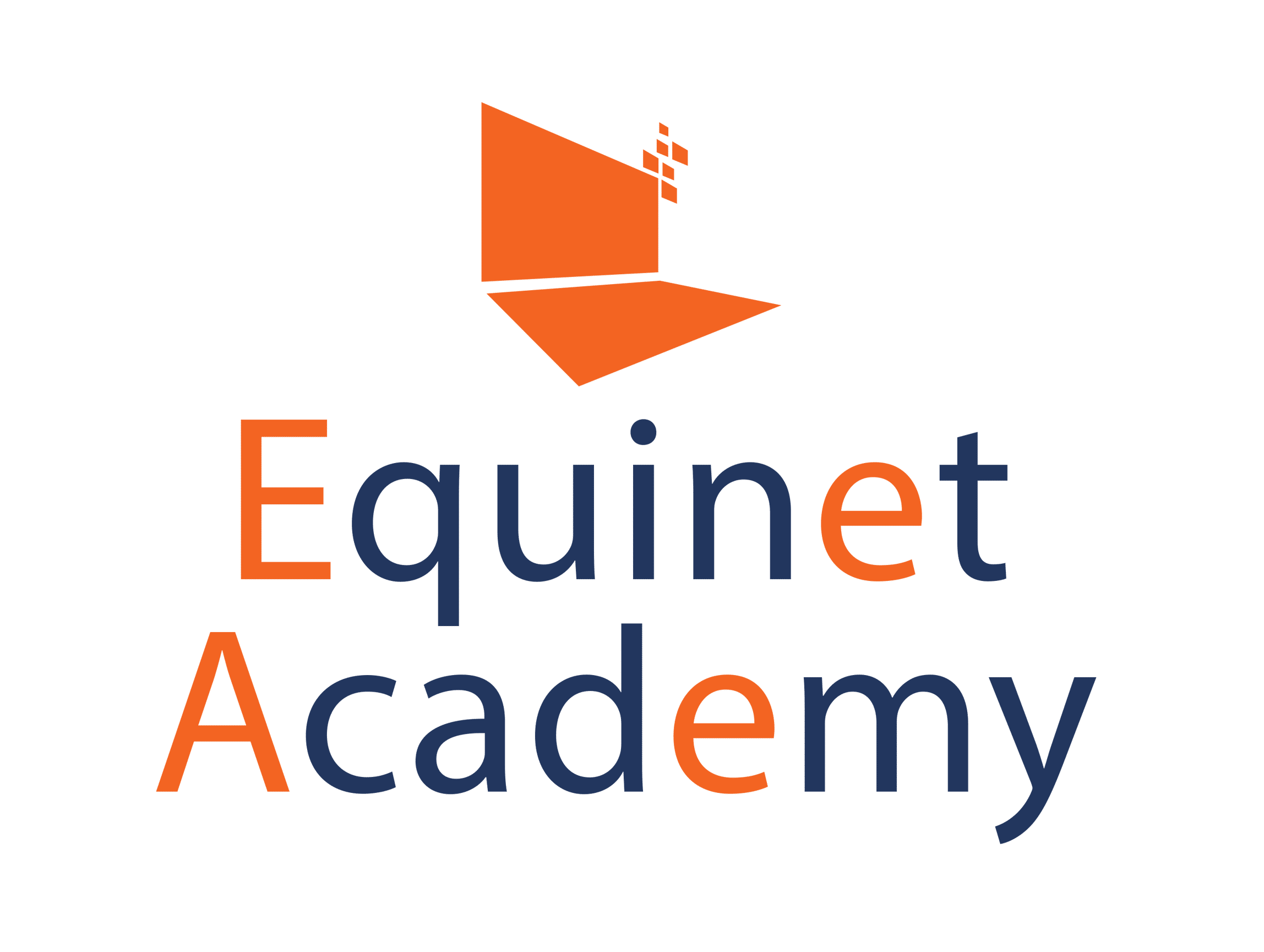


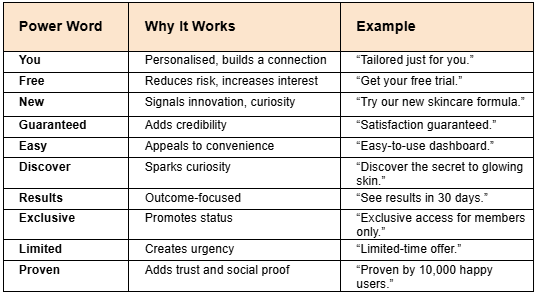
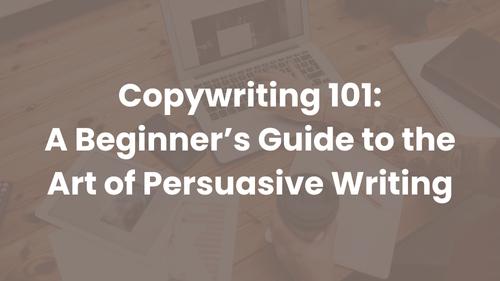

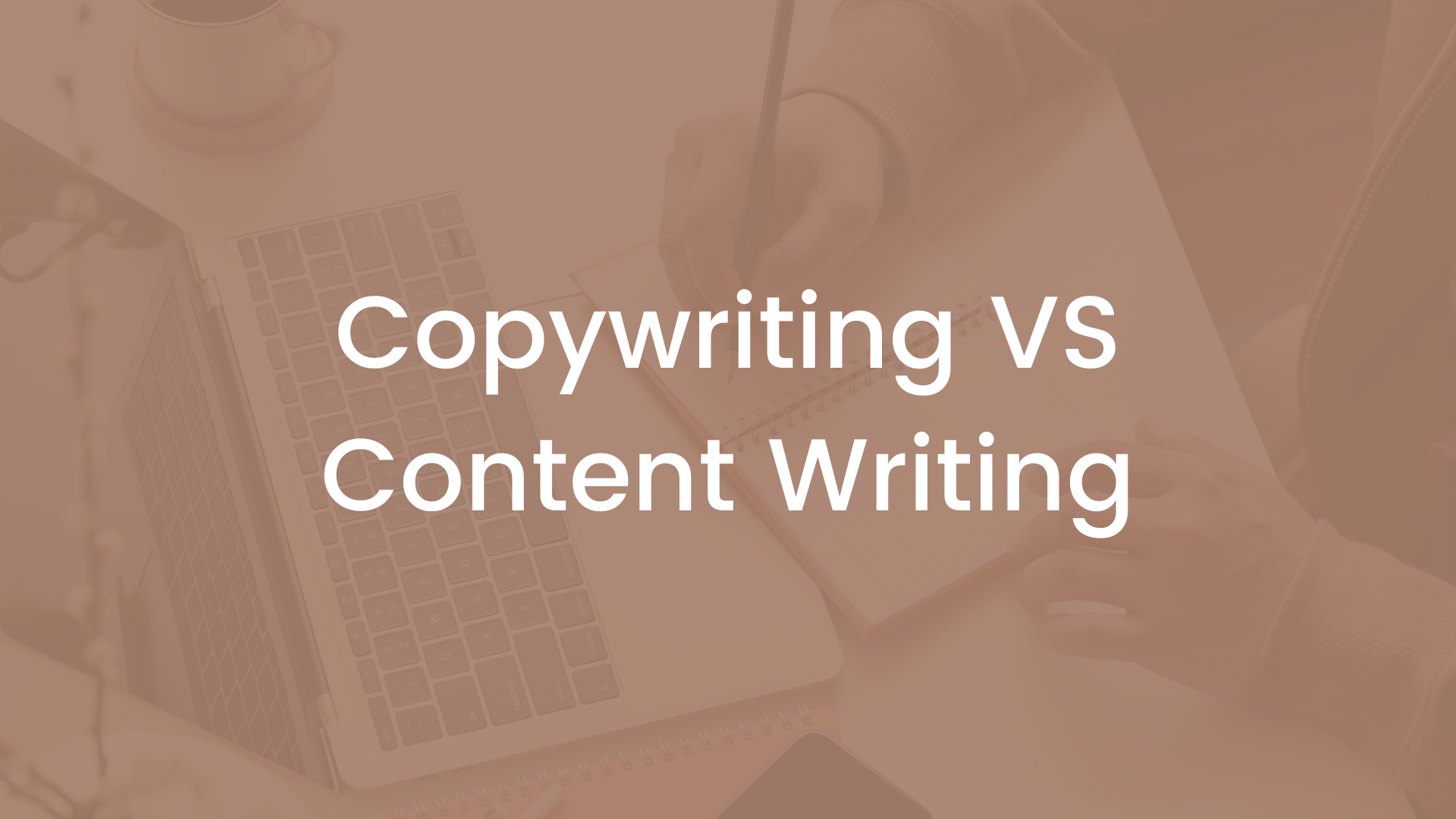
Reader Interactions